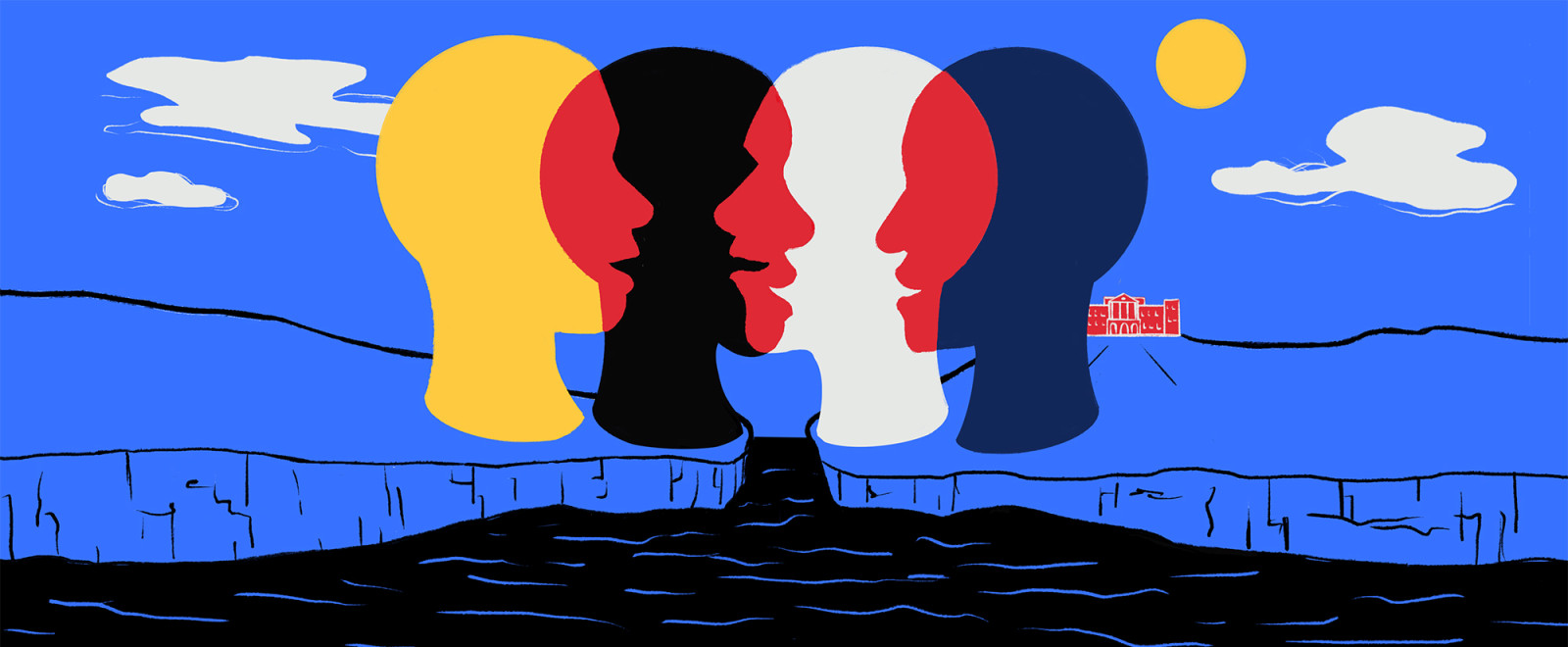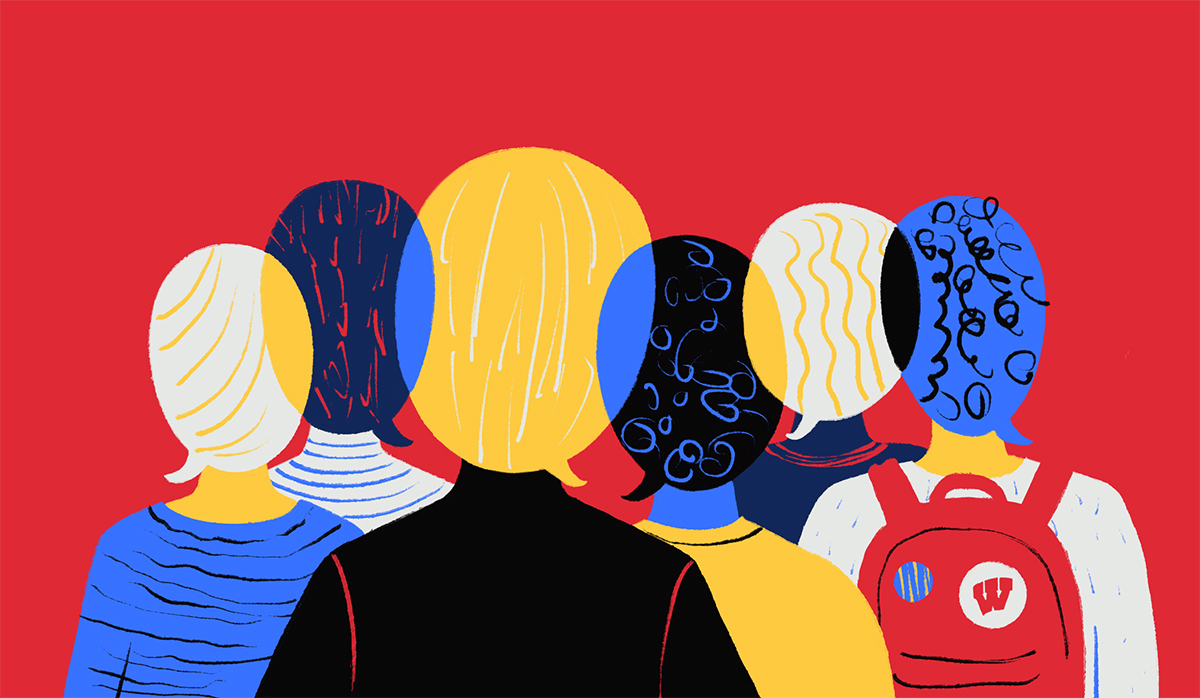
Bridging the Divide
A new dialogue series encourages UW students to talk through differences in ‘a space where they won’t feel judged.’
The students wander into the classroom, strangers to each other. Some of them are drawn by the free pizza, for sure, but most are eager to dive into one of the most controversial sociopolitical topics today: immigration.
The student facilitators at the University of Wisconsin–Madison event begin by covering a few ground rules: presume positive intentions, make space for everyone to speak. Then the discussion takes off. Who should get to immigrate to the U.S.? What factors are contributing to the border crisis? Does migration impact cultural identity?
The discourse is passionate but civil.
“I was interested in attending because it seemed like an opportunity to hear diverging opinions on an issue without the fear of things getting out of hand or hostile,” participant Alex Ratel says later.
Ratel, a political science major, is a senior at UW–Madison, where the event, part of the Bridging the Divide dialogue series, took place on a March evening in Ingraham Hall. The gatherings occur monthly, with a different topic each time — abortion, climate change, affirmative action. These Bridging the Divide discussions are also taking place across the 13 four-year campuses of the Universities of Wisconsin.
“The whole point is to get students from different ideologies in the same room to talk,” says Ruth Brash, associate director of the Tommy G. Thompson Center on Public Leadership, which is based at UW–Madison and sponsors Bridging the Divide on all campuses.
“Students [are] talking to each other about challenging issues in a space where they won’t feel judged or attacked.”
Brash learned from UW Law School Associate Dean Susannah Camic Tahk about a similar initiative at the law school at George Mason University and tapped the expertise of that project’s founder, Professor JoAnn Koob, to help her start a version for undergraduates in Wisconsin.
“What really sets the initiative apart is that the facilitators are students,” Brash says. “There are no grades. There are no faculty members leading it. It’s simply students talking to each other about challenging issues in a space where they won’t feel judged or attacked.”
‘Replacing tweets with talk’
The slogan for the project is “replacing snark with conversation, tweets with talk, and scrolls and likes with face-to-face dialogue.”
Michael Lueder, outreach affiliate for the Thompson Center, thought that one up.
“We needed something that would be easily understood on Instagram,” says Lueder, who oversees the project and facilitators.
Bridging the Divide began as a pilot project last spring on four UW campuses: Oshkosh, Eau Claire, Green Bay and Parkside. This past fall, it expanded to all 13 four-year campuses, including UW–Madison. Students apply to be the trained facilitators. Those who are selected are paid the equivalent of in-state tuition. Each campus has at least one facilitator.
“They are all go-getters and high achievers,” Lueder says. “And they’re doing really hard work. Getting people to talk about difficult issues in this political environment is not easy.”
There’s no partisan aspect to the project, Lueder says.
“I couldn’t tell you the political leanings of any of the student facilitators,” he says. “At no point do we ask.”
‘I listen more now and argue less’
Senior Zack Dulian, who facilitates the program at UW–Madison with junior Madeline Hutnik, says he got involved because he’d grown disappointed in the cultural climate around free speech.
“I decided to be the change I want to see,” he says.
“We’re not here for conflict,” Hutnik adds. “We just want to understand where other people are coming from and how they got there.”
Bridging the Divide is one of several initiatives at UW–Madison designed to promote pluralism and encourage dialogue across differences. Deliberation Dinners bring students together for a meal and a discussion facilitated by a UW–Madison instructor. The La Follette School of Public Affairs recently sponsored Community Conversations, a series of town halls and dinner events held across the state to promote civil dialogue among citizens. A new student organization, BridgeMadison, champions viewpoint diversity, responsible discourse and a solution-oriented political culture.
“To move ahead as a society, we need to make it less taboo to discuss difficult subjects together,” says Olivia Franklin, the Bridging the Divide student facilitator at UW–Stevens Point.
Franklin grew up in a politically divided family and says she has witnessed the polarization of society up close. Her work with the project has improved relationships with family members she vehemently disagrees with, she says.
“I listen more now and argue less,” Franklin says. “I allow conversations to move forward without the goal of trying to change someone’s mind.”
“To move ahead as a society, we need to make it less taboo to discuss difficult subjects together.”
Different views, same goal
The Oshkosh and Parkside campuses are now drawing large crowds.
“I hope to teach people that even if someone has views you don’t agree with or find offensive, there’s opportunity for dialogue and even consensus building,” says Grant Pitts, the student facilitator at UW–Parkside.
He’s found success by partnering with professors who are willing to turn over one class period each semester to the project. That ensures a core group of participants while still welcoming drop-ins.
At UW–Madison, the March session on immigration featured a robust discussion, though most in attendance came at the issue from the left side of the political spectrum. At the prior month’s event, there was a greater diversity of opinion, with a conservative student making an impassioned argument for eliminating diversity, equity and inclusion initiatives.
Lueder said the gatherings are playing out differently across the state — on some campuses, conservative students are outnumbering liberal participants, and vice versa at others.
Ratel, the UW–Madison political science student, said he went into the event on immigration primarily to listen, with no overly strong opinions on the issue. Especially with his major, he’s found value in every conversation.
“I am constantly thinking about public opinion and the path that people take to reach that opinion,” Ratel says. “To me, we cannot craft effective policy in this country if we do not understand how or why other people reached the conclusions that they did.”
